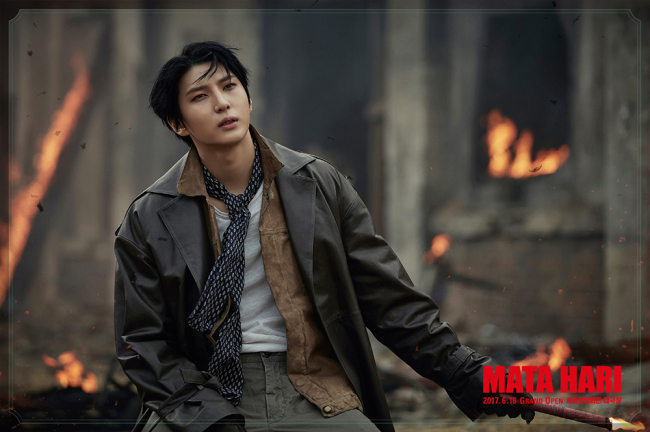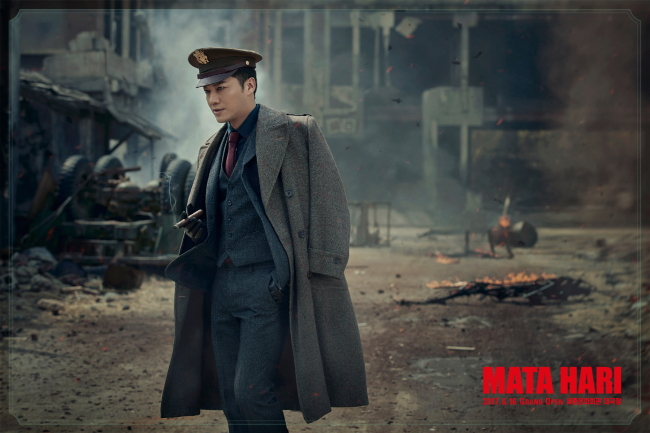Europe, in 1917, is torn apart by a raging World War I, but exotic dancer Mata Hari remains glamorous as ever, jumping between countries and captivating imaginations -- and sometimes more -- of high-profile personnel struggling with the battles at hand.
The dancer’s world is abruptly interrupted by a French intelligence official Col. George Ladoux, who forces her to become a spy by using her intimacy with high-ranking German military officials.
Young pilot Armand Gilot enters the mix, and a plot commences in which nothing is what it seems and morality and sincerity is constantly put to test.
 |
Promotional images for the musical “Mata Hari” (EMK) |
 |
Promotional images for the musical “Mata Hari” (EMK) |
 |
Promotional images for the musical “Mata Hari” (EMK) |
The Stephen Rayne-directed “Mata Hari” returns to Korean audiences following last year’s successful run. With music by Frank Wildhorn, written by Ivan Menchell, lyrics by Jack Murphy and with Eum Hong-hyun as executive producer, the musical sets on stage a dramatic reenactment of perhaps the world’s most notorious female spy.
“Mata Hari” attempts to portray both the fancy stages of Moulin Rouge and gruesomeness of war. The bloody and dying soldiers, Ladoux’s frustration and despair in “Ten Thousand” shows that he is not a simple “villain.”
In the limelight is the title character, played by Ock Joo-hyun and Cha Ji-yeon.
Ock lives up to her on-stage reputation as the seductress, as the work’s strongest scenes are performed by the actress in both “Two People” and “One Last Time,” which wrap up acts one and two, respectively.
Her strong voice and commanding presence caught the charisma behind the fictional version of Mata Hari. But she also depicts the woman carrying baggage, from her past to her present secret duties walking a tightrope between countries at war.
The male lead role of Armand is reprised by Jung Taek-woon, whose soft voice, lanky stature and boyish charms describe a man precariously torn between his emotions and the duty he is given.
The young actor -- better known as idol singer Leo of VIXX -- attempts to hold his own against seasoned veterans and to his credit, surprisingly pulls it off for the most part. The youthful actor captures the essence of a naive, young romanticist whose moral center -- despite all that he has been through -- remains strong.
Standing opposite Armand is the demanding presence of Ladoux, an ambitious and ruthless man who will do whatever it takes to get what he wants. Moon Jong-won’s strong baritone and unwavering attitude shows that this is not the man to be messed with. But his solemn attitude toward fellow men at war -- with a hint of hypocrisy -- indicates the immense pressure and inner conflict he feels as the man on whom the lives of thousands of soldiers depend.
The role of Armand is shared between Um Ki-joon and Lim Seul-ong, while Ladoux is also played by Min Young-ki and Kim Joon-hyun.
Choi Na-rae and Kim Na-yoon depict the humble and loving nature of Anna, whose care for Mata Hari is described in “Through You.” Kim Neul-bom’s Gen. Von Bissing, initially captivated by the dancer’s charm, but who ends up playing a key role in her downfall.
Almost as impressive as the cast is the stage; the use of numerous props and makeshift structures works effectively to create locations that look very life-like.
Mata Hari’s bedroom is delicately created, right down to the sofa, the phone and stairway up to the balcony, while the streets of Paris come to life on stage with buildings and complementary moonlight.
Although she was executed for being a double agent, the real-life Mata Hari’s true color remains a mystery. Yet, through stunning choreography, a dynamic stage and captivating music and acting, “Mata Hari” manages to provide a riveting tale.
The show continues until Aug. 6 at the Sejong Center in Seoul. Ticket prices range from 50,000 won to 140,000 won.
For more information on the tickets, visit ticket.interpark.com or call 1577-6478.
By Yoon Min-sik
(
minsikyoon@heraldcorp.com)










